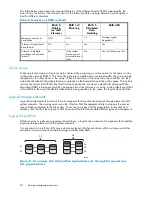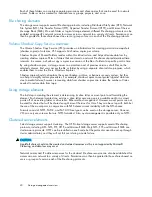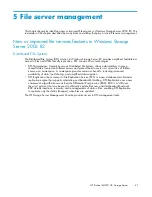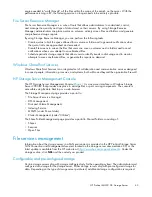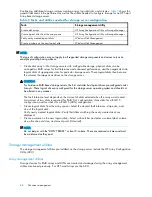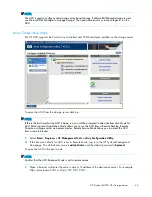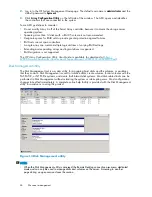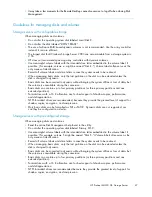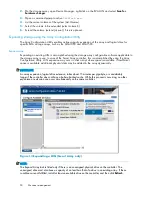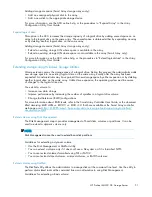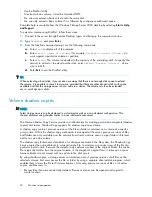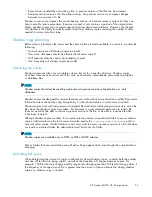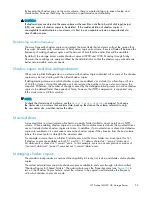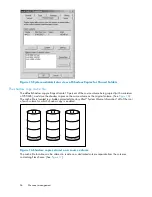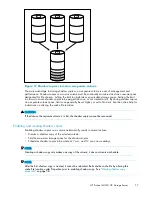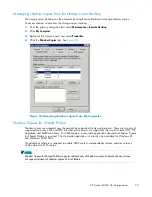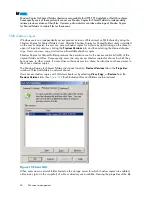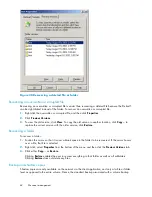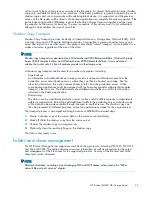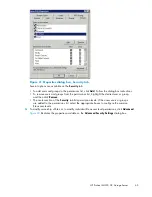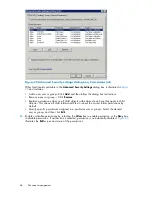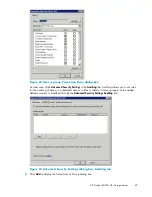
•
Use the DiskPart utility.
•
To extend a basic volume, it must be formatted NTFS.
•
You can only extend a basic volume onto the same disk.
•
You can only extend a basic volume if it is followed by contiguous unallocated space.
Complete help is available from the Windows Storage Server 2003 desktop by selecting
Start > Help
and Support
.
To extend a volume using DiskPart, follow these steps:
1.
Connect to the server through Remote Desktop, login, and bring up the command window.
2.
Type
DiskPart
and press
Enter
.
3.
From the DiskPart command prompt, use the following commands:
a.
Enter
list
to display all of the volumes.
b.
Enter
select [name of volume]
(for example,
DiskPart> select Volume 4
) to
work against a particular volume or partition.
c.
Enter
Extend
. The volume is extended to the capacity of the underlying disk. To specify the
amount to extend or to extend another disk, enter
extend [size=n] [disk=n]
, where
size is in MB.
d.
Enter
Exit
to exit the DiskPart utility.
TIP:
When extending a basic disk, if you receive a message that there is not enough disk space to extend
the volume, it is possible to convert to dynamic, provided that there are other dynamic disks with space
available and that the storage server is not a node in a cluster. The volume can then be extended
over a set of dynamic disks.
Volume shadow copies
NOTE:
Select storage servers can be deployed in a clustered as well as a non-clustered con
fi
guration. This
chapter discusses using shadow copies in a non-clustered environment.
The Volume Shadow Copy Service provides an infrastructure for creating point-in-time snapshots (shadow
copies) of volumes. Shadow Copy supports 64 shadow copies per volume.
A shadow copy contains previous versions of the
fi
les or folders contained on a volume at a speci
fi
c
point in time. While the shadow copy mechanism is managed at the server, previous versions of
fi
les
and folders are only available over the network from clients, and are seen on a per folder or
fi
le level,
and not as an entire volume.
The shadow copy feature uses data blocks. As changes are made to the
fi
le system, the Shadow Copy
Service copies the original blocks to a special cache
fi
le, to maintain a consistent view of the
fi
le at a
particular point in time. Because the snapshot only contains a subset of the original blocks, the cache
fi
le is typically smaller than the original volume. In the snapshot’s original form, it takes up no space
because blocks are not moved until an update to the disk occurs.
By using shadow copies, a storage server can maintain a set of previous versions of all
fi
les on the
selected volumes. End users access the
fi
le or folder by using a separate client add-on program, which
enables them to view the
fi
le in Windows Explorer. Accessing previous versions of
fi
les, or shadow
copies, enables users to:
•
Recover
fi
les that were accidentally deleted. Previous versions can be opened and copied to
a safe location.
52
File server management
Summary of Contents for ProLiant ML350 G5
Page 10: ...10 ...
Page 22: ...22 The HP storage server solution ...
Page 86: ...86 Print services ...
Page 118: ...118 Network adapter teaming ...

